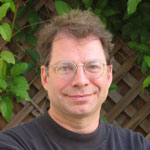Dr. Roger Brent
Roger Brent’s recent translation from professorial grey eminence to blogosphere came via Biowar for Dummies: How hard is it to build your own weapon of mass destruction? We take a crash course in supervirus engineering to find out. This article began after Roger sent the author, Paul Boutin, an unpublished paper in which he wrote that genetically engineered bioweapons developed by small teams are a bigger threat than suitcase nukes. Roger is one of a growing number of researchers who believe that a bioterrorist wouldn’t need a team of virologists and state funding. He says “advances in DNA-hacking technology have reached the point where an evil lab assistant with the right resources could do the job.”
Dr. Roger Brent is Director and President of The Molecular Sciences Institute (MSI), Director of the Center for Genomic Experimentation and Computation, and Adjunct Professor at UC San Francisco. He was previously Professor at the Harvard Medical School Department of Genetics and is one of the founders of Current Protocols in Molecular Biology. He has been a senior scholar of the Ellison Foundation and his work on protein interaction methods has been recognized with a Gabbaye prize for biological technology.
The Molecular Sciences Institute is an independent, nonprofit genomic research laboratory that combines genomic experimentation and computer modeling. The mission of MSI is to predict the behavior of cells and organisms in response to defined genetic and environmental changes. Progress toward this goal increases our understanding of biological systems and, if work is successful, may catalyze radical changes in how diseases are understood and treated.
Roger’s main work is the Alpha project, a multidisciplinary genomic research project that attempts to gain a greater understanding of quantitative biological function by deep study of a cellular information processing pathway. Representative recent publications include Can computers help explain biology? in Nature magazine, Regulated cell-to-cell variation in a cell fate decision system in Nature magazine, Using protein-DNA chimeras to detect and count small number of molecules in Nature Methods, Automatic generation of cellular reaction networks with Moleculizer 1.0 in Nature Biotechnology, A partnership between biology and engineering in Nature Biotechnology, Cyclin D3 activates Caspase 2, connecting cell proliferation with cell death in Proceedings of the National Academy of Sciences of the United States of America (PNAS), Current Protocols in Molecular Biology, and Short Protocols in Molecular Biology, 4th Edition.
Roger earned a BA in Computer Science and Mathematics from the University of Southern Mississippi in 1973, where he worked at applying AI techniques to protein folding and earned a Ph.D. in Biochemistry and Molecular Biology from Harvard University in 1982. He is an inventor on 12 issued and several pending US Patents.
Read his testimony to the US House Homeland Security Committee Subcommittee on Prevention of Nuclear and Biological Attack! Read his LinkedIn profile.
